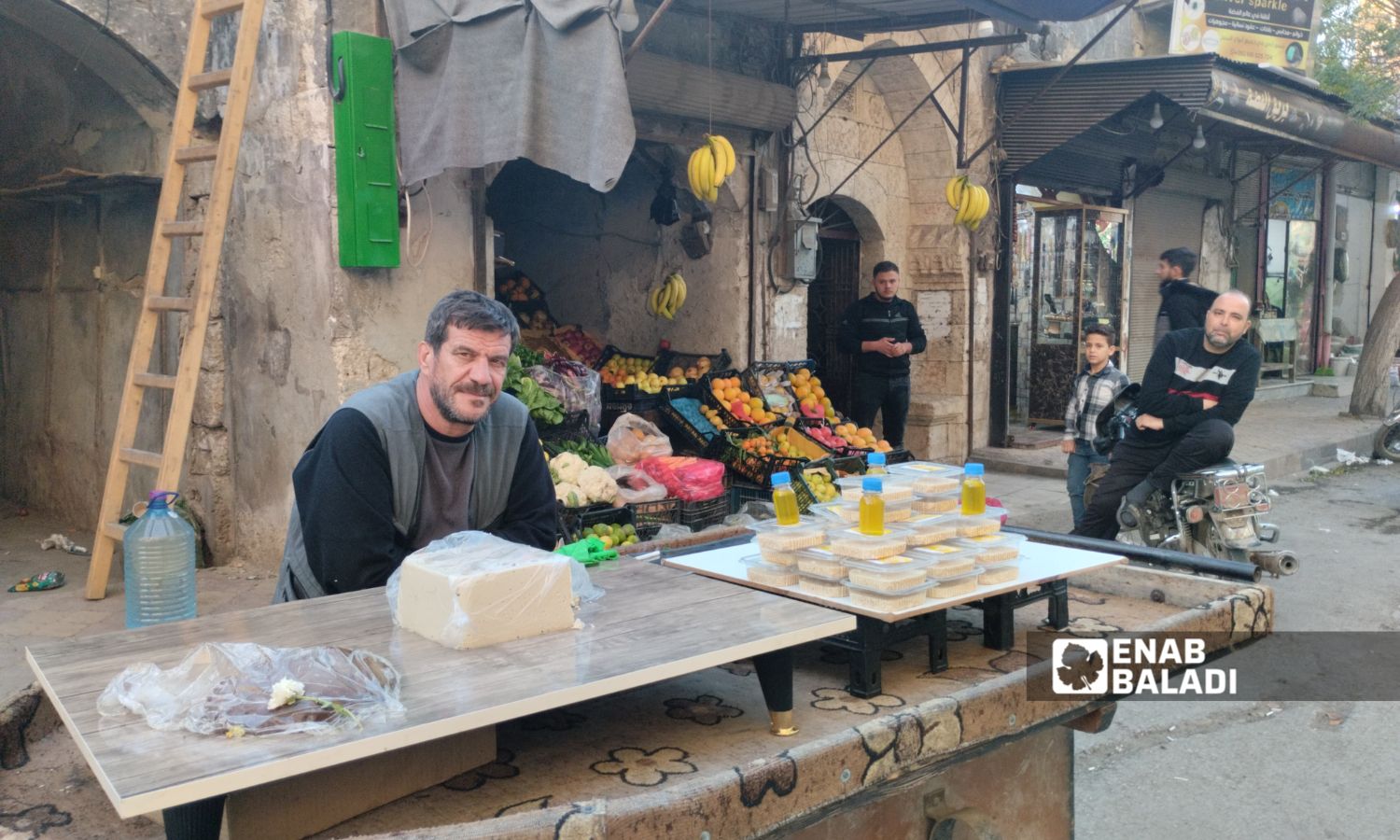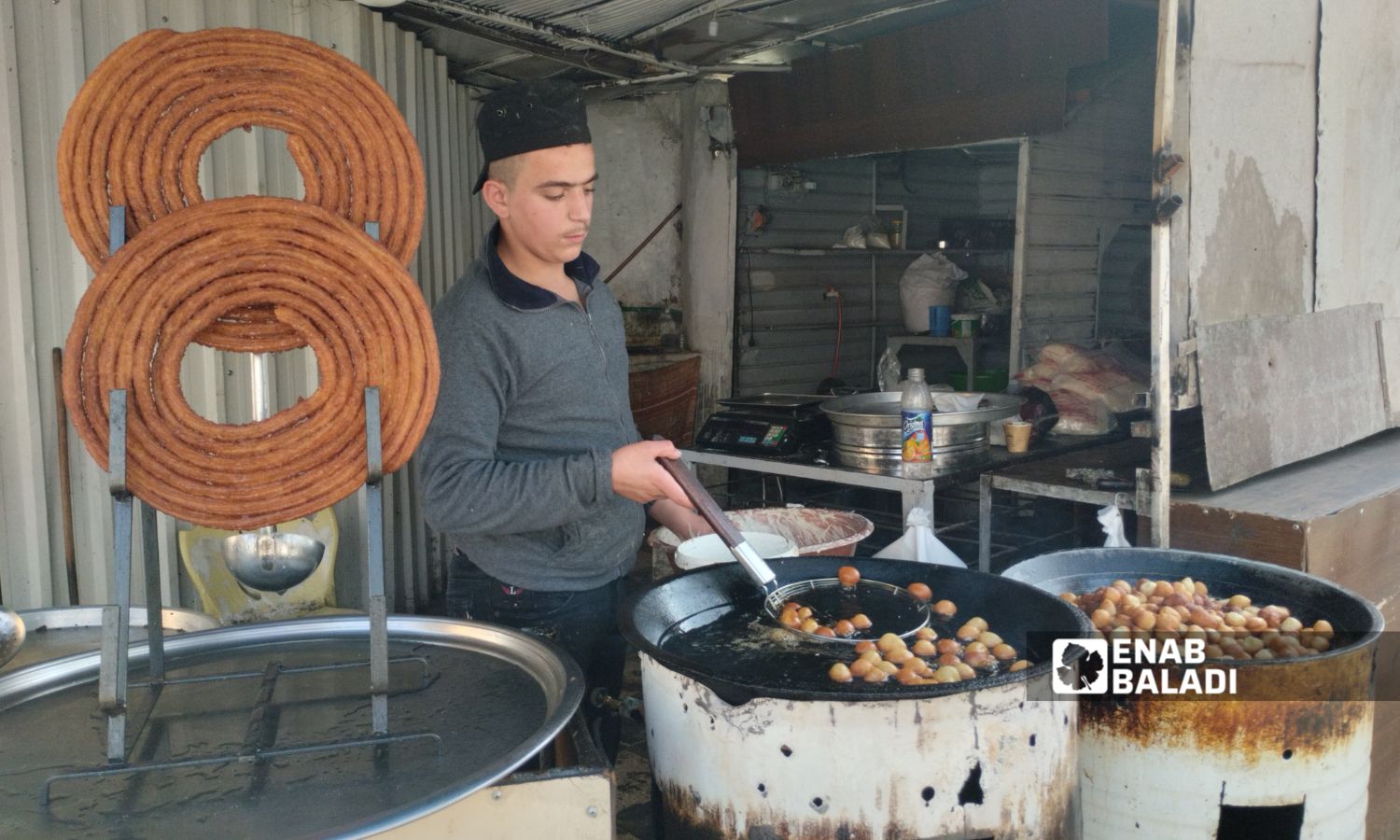



Idlib – Samah Alloush
Abdul Hamid sets out early in pursuit of his livelihood, preparing “sahlab,” a mixture of milk, a special powder, starch, sugar, and garnished with cinnamon, as he sells it from his mobile cart in the streets of Idlib, northwestern Syria.
The young man, displaced from the Bab Dreb neighborhood in Homs, had originally worked in pastry and sweets making. However, due to rising costs of equipment and rent, he decided to operate a mobile cart in Idlib, where he resides.
With the arrival of winter, he added “sahlab” to his offerings of Syrian kaak, cheese and thyme pastries, and “muhammara” in order to support his family and pay his rent, which is 2,400 Turkish lira (70 US dollars).
The young man told Enab Baladi, “Sahlab suits the cold weather, and I sell a cup for five Turkish lira,” adding that he cannot increase the price, as most customers belong to the middle and lower classes, and that the profit margin is “acceptable.”
As rainfall and colder temperatures set in, the prevalence of carts selling seasonal food and drinks has increased, providing a source of livelihood for their owners in Idlib.
Carts serving “sahlab,” kaak, “mushabak,” “awameh,” “kseeb,” halva, and “Abu Hadeed” are visible on the roads and near official institutions and schools from early morning until evening.
Winter imparts a unique flavor to Syrians, as the market for certain seasonal foods associated with this season thrives, many of which are inherited from ancestors.
Despite the development and arrival of other types of Eastern and Western sweets in local markets in Idlib, some traditional varieties remain present, such as tahini halva made from sesame seed paste and sugar, and “kseeb,” a dark brown sweet made from roasted sesame seeds mixed until it reaches a dough-like consistency.
The “Abu Hadeed” variety, or “simsimyah,” is a sticky substance with a chewy texture made from sesame as well and is considered a popular sweet.
Fifty-something-year-old Abdul Karim Daboul, a street vendor in Idlib, told Enab Baladi, that “simsimyah” is a common and popular choice in Idlib, with sales peaking in the winter.
He mentioned that the current generation is often unaware of these varieties and their names, and that knowledge of them is primarily limited to the older generation, as most customers are elderly who seek the sweets for their perceived health benefits in treating throat and bronchial inflammation and providing energy to the body.
The price for one kilogram of “kseeb” is 150 Turkish lira, “Abu Hadeed” costs 100 Turkish lira per kilogram, and halva is priced at 120 Turkish lira per kilogram, according to the seller.
Daboul noted that the diversity of his offerings is linked to seasons, as he sells what is popular and in demand in markets, such as figs, citrus fruits, and some vegetables in the summer and spring.
Young man Youssef Haboush works with his father preparing “mushabak” and “awameh,” a seasonal inherited profession, sold from the beginning of October until the end of February.
The young man told Enab Baladi that demand for sweets increases in winter, and “awameh” holds a special nostalgia for the displaced from various Syrian provinces, who recall winter nights in their cities.
He added that demand is weak for “awameh” stuffed with walnuts due to their high price, as few can afford them, with typical demand for regular “awameh” at a price of 60 Turkish lira per kilogram, and “mushabak” priced the same.
Haboush creates “awameh” and “mushabak” using flour, sugar, and frying oil, considering it a “noble and profitable” profession for one who respects it and is generous in it.
He pointed out that he and his father strive to sell and introduce products that align with the seasons, as they prepare “marouk” during Ramadan as an additional item before transitioning to selling vegetables at the beginning of spring until the end of summer, before returning to their main trade in “mushabak.”
There are no licenses for street vendors whether they sell food, fruits, or beverages, according to the advisor to the Minister of Local Administration in the Syrian Salvation Government (SSG) operating in Idlib, engineer Said al-Ashqar, in a prior clarification to Enab Baladi.
According to al-Ashqar, there are conditions that vendors must adhere to, which are general stipulations such as not encroaching on roads or causing traffic accidents or obstructing traffic.
He mentioned that the ministry has allocated specific areas in each region, where vendors and street sellers are allowed to operate, away from gatherings and major public roads.

The spread of carts selling winter-related foods and drinks continues to rise in Idlib – November 17, 2024 (Enab Baladi/Samah Alloush)
if you think the article contain wrong information or you have additional details Send Correction